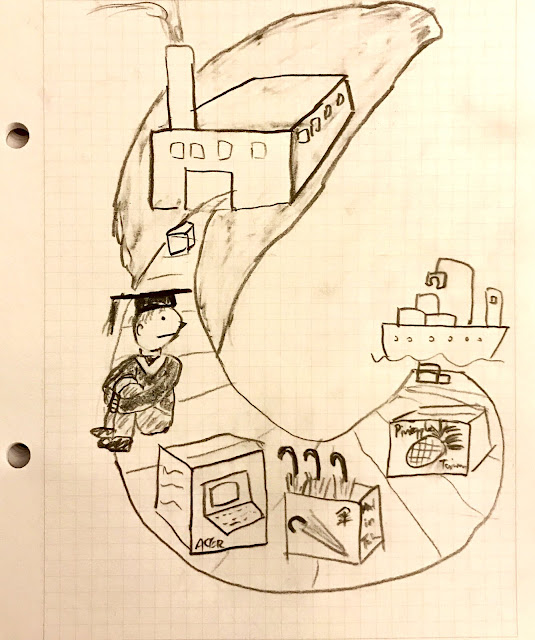談判桌上的藝術 Hostage at the table
談判桌上的藝術 Hostage at the table
第一次認識“談判桌上的藝術”這本書,是我在洛桑唸管理學院的最後一堂課。正確來說,我在那堂課聽了教授 喬治. 科爾瑞瑟 (George Kohlrieser)的人生故事,還有喬治的想法:如何讓商務人士從他的人質談判經驗中學習。
喬治在碩士班最後一堂課的演講題目是“連結與分離 - 成功的關鍵”。喬治是一位前人質談判家,也就是當警察碰上歹徒狹持人質時,上前去跟歹徒談判的專家。“人不會殺人”,喬治在課堂上說到:“會殺人的人,把受害者當物品看待”。喬治說的很自然,很難相信他自己就被歹徒拿武器狹持過四次。
讓我很好奇的是,為什麼學校的最後一堂課要請一位人質談判的專家來演講,這跟我每天的生活有什麼關係?希望我不會有需要用到跟歹徒談判的這一天。喬治後來才解開謎底,原來他不是要教我們變成口齒伶俐的說客,他是要教我們 “道別” 的重要性。
分離,代表為失去的事物哀悼。在喬治處理過的人質談判中,幾乎所有的案例都牽扯了主角失去了一件重要的人事或物。案例的主角失去了他愛的人,工作,地位,人活著的意義,夢想,信仰,或是人生的選擇。當人們無法處理分離,他們也無法再和周圍的人建立連結。這也是為什麼人們會盡一切可能,去奪回他們失去的東西,就算需要傷害他人或殺人也無所謂。
喬治在處理人質事件時,最重要的關鍵就是和歹徒建立連結。透過建立連結,喬治可以喚起歹徒跟人之間的信任,進而放下他們失去的東西。這讓我想起來臉書最新的政策,給予每個員工20 天的有薪假,去哀弔至親的死別。如果人們不能去哀悼他們失去的東西,他們會成為自己執念的人質,一生都痛苦的想要尋回失去的東西。
我們雖然沒有被人拿刀架過脖子,但我們卻有可能拿了一把無形的槍抵著自己的頭,被自己綁架了。這聽起來很匪夷所思,但卻發生在我們每天的生活。我們告訴自己我們沒有別的選擇了,我們出於恐懼而作出行動。喬治同時指出,預期落失的恐懼有可能跟真正失去一樣糟。這些恐懼啟動我們原始大腦裡面 “該逃跑還是該戰鬥?”的本能,使得我們陷入自我保護的迴圈之中。
如果我們要活得精彩,就必須要活得沒有恐懼。喬治用攀岩當例子來講解。當攀岩時,需要一個人在下方拉繩的 “確保者”。確保者的工作,是專心的觀察攀岩者,以防止攀岩者掉落時拉住他。如果沒有確保者,那攀岩者很難放膽地去爬上頂端。
在我們的一生中,我們向攀岩者一樣,依賴給我們安全感的人事物。我們知道這些“安全島”會在我們需要他們時在那裏支持我們,鼓勵我們去嘗試。換句話說,跟人建立連結,我們才能去追求我們的目標。
我們可能會遇到一些人,他們非常自滿,說他們不需要別人。這些人不相信別人,而總是認為事情只有自己來才能做得最好。探究起來,這些人過去通常有些還沒放下的離別,而這也影響了他們與人建立連結的能力。
因為沒辦法與人連結,自滿的人容易陷入完美與勝利帶來的成就感。也就是說,他們依賴成就感帶來的安慰。這些自滿的人可能表面上很成功,但內心卻非常脆弱。過度依賴成就感和沒有解決過去的離別,代表這些人們每天活在恐懼之中。在他們的心中有一個疑問 “如果我失敗了,人們還會愛我嗎?”。這一個心理狀態很難維持長久,因為每一次的成功只會讓放下一切更為困難,也讓失敗看起來越來越可怕。
爬得越高,摔得越痛。但有時,摔倒失敗是一種祝福。失敗代表人們可以從追求完美的壓力中解放。就像一座搖搖欲墜的疊疊樂,終於倒下的那一刻,人們終於不用再提心吊膽了。
我們不希望自己活得像一座疊疊樂一樣提心吊膽。我們希望能像一座金字塔一樣聳立而穩固。心理學家麥斯羅的 “需求金字塔” 理論也剛好呼應了喬治 “攀岩與確保者”的例子。在“需求金字塔”理論中,人們唯有滿足了”愛與被愛“的需求,才能去追求自信心和自我實現的成就感。一個有穩固安全靠山的人,更願意去為他們的目標不停地嘗試。就像山姆爾.貝克書中寫道
我們不希望自己活得像一座疊疊樂一樣提心吊膽。我們希望能像一座金字塔一樣聳立而穩固。心理學家麥斯羅的 “需求金字塔” 理論也剛好呼應了喬治 “攀岩與確保者”的例子。在“需求金字塔”理論中,人們唯有滿足了”愛與被愛“的需求,才能去追求自信心和自我實現的成就感。一個有穩固安全靠山的人,更願意去為他們的目標不停地嘗試。就像山姆爾.貝克書中寫道
“多嘗試,多失敗,沒有關係。再試一次,再失敗一次。但這次,失敗的比上次好。”
I learned about the book “Hostage at the table” during my last session at IMD MBA. To be correct, I learned about the life story of Professor George Kohlrieser, and how he came up with his theory of how business leaders can learn from hostage situations.
George was giving the last lecture of the IMD MBA called “Bonding and separation - A key to high performance”. George was a hostage negotiator. He was the guy police calls in when situation becomes tricky, and bloodshed seems inventible. “People do not kill people.” George said in class “People who kill see others as objects” That is easily said from someone who was held at knifepoint four times in his life.
What kept me curious is what does hostage negotiation skills have to do with my daily life? Hopefully I will not need to practice these skills ever in my life. Then George dropped the “a ha” moment. He is here not to teach us to be smart talkers, he is here to tell us the importance of saying goodbye.
Separation means grieving for a loss. Over all the critical situation George has handled, it always involves the lost of something or someone significant. People who lost their love ones, lost a job, lost their life purpose, lost a privileged status, lost their dream, lost faith or lost control over their lives. When people cannot deal with the separation, they cannot bond with others. And that is when people will do anything to retrieve what they lost, even if it means hurting other people.
George could intervene the situation, by establish a bond with the hijacker. By bonding with the person, George could remind the person their capability to bond with others and grieve for their loss. This reminds me of Facebook new policy that employee have 20 days immediate leave for death of an family member. If people do not allow themselves to grieve for their loss, they will become hostages of their own minds and spend their lives searching in agony.
We may not have been held at knife point in our life, but we could have hold an imaginary gun to our own heads, and “hijack” ourselves with thoughts. Scary as it may sound, this metaphor happens in our daily lives. We tell ourselves that we have no choice, so we jump into action out of fear in our minds. George also points out anticipated lost, the fear of losing something important in the future, could also be as bad as lost itself. All of these fears turns on our natural “fight or flight” instinct, and the brain deadlocks into defence mode.
The way to live to our full potential is living a life without fear. The metaphor is a rock climber with someone holding the security rope below the cliff, the “belayer”. Without the security and trust of the belayer, the rock climber will not be able to go for the top.
Throughout our lives, we rely on our “secure bases” that we know we can turn to. These secure bases reassure us that they are here to stay, and encourages us to “go for it” and “try again”. In other words, bonding with secure bases allows us to bond with our personal goals.
We might have also encountered over-achievers that say “I rely on only myself.” These people find it difficult to trust others, and believe they always need to “do it myself”. This could sometimes be traced back to an incomplete separation in their past, which inhibits their ability to bond with others.
As an alternative, over-achievers become obsessed with the comfort of “winning” and “perfection” provides, as goal achieving becomes their primary secure base. As successful they might seem, they are fragile on the inside. The imbalance of over-bonding to goals and not confronting their past, means living in fear everyday. “What happens when I fail, will people still love me?” This mental state is unsustainable overtime, as each success only brings the stakes higher, and the inevitable crash becomes increasingly scarier.
The bigger they are, the harder they fell. But sometimes, failing is a blessing in disguise. Failure allows the chance to people the relief from the pressure of perfectionism. Like a the moment a stack of Jenga crashing down after rounds of stacking.
Instead of living like a fragile Jenga, we should allow ourselves to live like an everlasting pyramid. Resembling like a pyramid, Maslow’s hierarchy of needs echoes with George’s climber/belayer metephor. According to Maslow, self-esteem and self-actuation can only be established on the basis of love and belongingness. People who have strong secure bases they can turn to, are more willing to commit to their goals, who tirelessly try again and again. As in the famous quote of Samuel Beckett:
“ever try, ever fail, no matter. Try again, fail again, fail better”.
Copyright 2017 EricaShaneView . All rights reserved.




Comments
Post a Comment